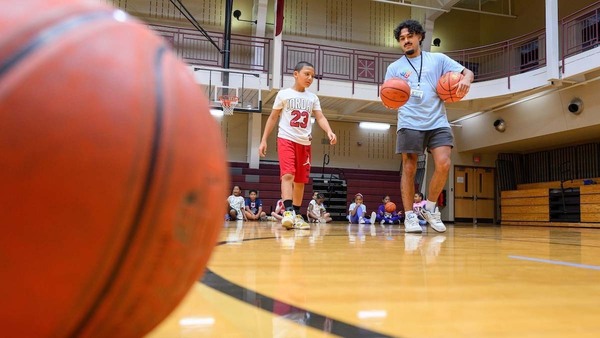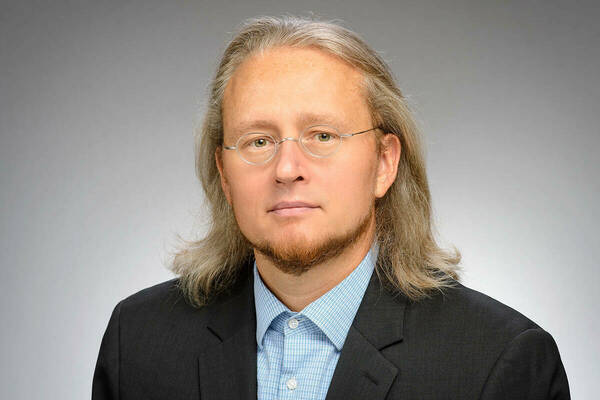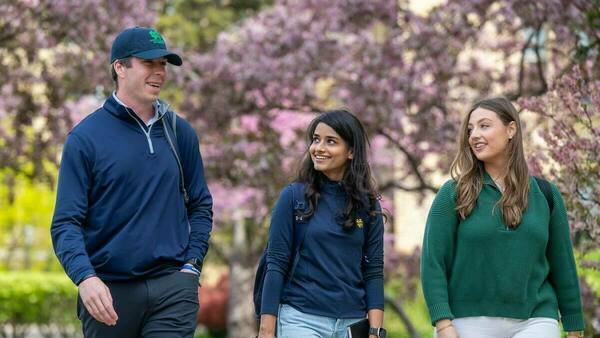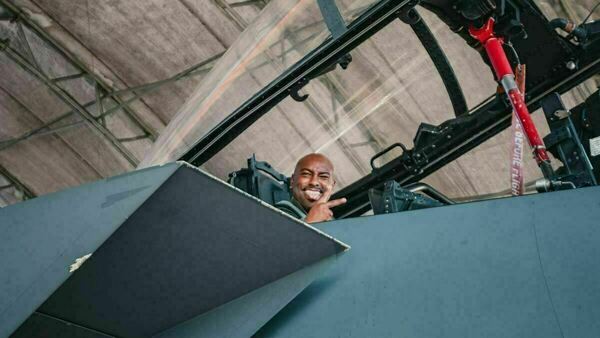Sports program promotes health and wellness, offers life lessons to Robinson Center youth

On a recent Wednesday, a group of kids ranging in age from about 6 to 11 climbed aboard a waiting van and traveled the three miles south from the Robinson Community Learning Center (RCLC) to Studebaker Golf Course in South Bend, home to the John and Kathy Postle Golf Learning Center. Spilling out of the van in the tiny parking lot, the kids walked excitedly through the arched entry gate, past the first tee box and into the clubhouse, where Jenny Zimmerman, director of First Tee Indiana in Michiana, was waiting for them.
Noting the presence of lightning in the area, Zimmerman, a former collegiate golfer, offered a quick lesson in weather safety: “One thing about golf, when there’s lightning, we gotta move inside,” the former full-time attorney said.
Developed on land donated to the city by the Studebaker family, Studebaker Golf Course is South Bend’s oldest golf course, dating to 1919. Its nine holes total just 1,900 yards, and with few hazards, it plays like a par 3 course — short and easy. For countless area golfers, it’s where they got their start.
The John and Kathy Postle Golf Learning Center was added to the course as a 2,800-square-foot addition to the clubhouse in 2021, complete with a golf course simulator, a putting green, classroom space and a kitchen overlooking the practice green.
With bad weather threatening, the kids split into groups and practiced their putting, chipping and driving skills from the comfort of the learning center, absorbing important lessons in the process.
“We are about 75 percent life skills and values and about 25 percent golf,” Zimmerman said. “So, although we teach kids how to hold a golf club and how to make contact with the ball and all of those things, we’re also teaching them honesty and integrity, sportsmanship, growing through challenges and setting goals, appreciating diversity — all of those things that they need outside of the game of golf.”
Such values are not specific to golf, however, which is why the RCLC took a broad view this year when considering how best to incorporate sports into its annual Summer Scholars & Day Camp program.
In addition to golf, kids spent time each Wednesday learning about basketball at Holy Cross College, baseball at Foundry Field, tennis at Adams High School and ice skating at Compton Family Ice Area — part of an effort to introduce them to a wide-range of activities while imparting important lessons about things such as teamwork, sportsmanship and self-discipline.
In preparation for this, the kids were presented with a list of sports at the start of the summer and asked to rank them by choice. They were then assigned to one based on those rankings, taking into account the available number of spaces at each location. Whenever possible, the kids were assigned to their sport of first or second choice.
Spanning six weeks between the typical spring and fall semesters, the Summer Scholars & Day Camp program offers math and reading lessons in the mornings and cultural and recreational programming in the afternoons to kids in grades 1 through 8.

“Part of the magic of the Robinson Center summer is that fun and play every afternoon keeps kids coming back for the important academic ‘work’ they do at camp every morning,” said Clare Roach, associate director of the RCLC, an off-campus educational initiative of the University of Notre Dame that offers year-round programming and serves as a gathering place for area youth and adults.
Susan Devetski, director of the RCLC, added, “The ultimate goal isn't athletic excellence but rather proficiency to give kids a chance to feel confident enough to engage in a sport perhaps in high school or with friends for fun.”
Ditching screens
In the present, it also teaches kids ways to pass the time without screens, which, whether at home or school, increasingly occupy their days.
According to the American Academy of Child and Adolescent Psychiatry, children ages 8 to 18 in the U.S. spend an average of seven and a half hours a day in front of a screen. And while the relationship between such exposure and mental and physical health is complex, mounting evidence points to a correlation between excessive screen time and problems such as obesity, lack of sleep, low self-esteem and lower grades in school.
“In thinking about the program, we wanted the kids to participate in something that mitigates negative mental health outcomes, keeps them off screens and gives them an opportunity to become proficient at a sport they might not otherwise have an opportunity to experience,” Devetski said, adding, “We hope that kids might grab a racket, or their gym shoes or head out to a golf or skating activity long after this camp is over because they have the confidence and experience to do so, thus planting the seeds for life long health and well-being.”
Currently operated as a pilot, the program is a collaboration among the RCLC and several local partners, including Notre Dame Athletics, AmeriCorps, Holy Cross College, the South Bend Community School Corp., South Bend Venues Parks and Arts, the United States Tennis Association and First Tee, among others.
Phil Robles, an AmeriCorps member assigned to the RCLC, led the basketball portion of the program at Holy Cross, where he played collegiately before graduating in May. Robles grew up in South Bend. He played high school basketball at Riley High School on the city’s south side.
“It’s been great,” Robles said of the experience. “I love working within the community I grew up in … just being around the kids and coming in to serve every day and seeing their faces. I know Wednesdays are a big day because they get to go play their sport and they’re so excited on the bus talking about it and they continually talk about it throughout the week. So, it’s been amazing.”
Back at Studebaker, Riley Crump, 11, was taking a break from practicing her chip shots.
She said in choosing which sport to play this summer, her mom encouraged her and her twin sister to take up golf as one of the few they’d never tried before.

So far, she loves it.
“I think it’s my new sport now,” she said, noting that unlike basketball where “you get shoved a lot, it’s a sport where you don’t get hurt.”
Nearby, Adelaide Chase, 9, was practicing hitting foam balls into a chipping net, an instructor looking on.
Asked what she liked about golf, she said, shyly, “I like that I can relieve my anger.”
How so?
“By hitting (the ball) as hard as I can.”
She said her favorite part about golf — aside from not having to catch things like in basketball and baseball — was “watching yourself improve.”
Zimmerman, for her part, had nothing but praise for the kids and for RCLC leadership as well.
“It’s been fantastic,” she said. “The leaders at the RCLC are among the best in the community that we’ve worked with. They get involved with the kids; they’re respectful of the kids; the kids are respectful of them, and that then translates to us.”
She added, “I think it’s going to be a great partnership going forward, and I hope they (the RCLC) feel the same way.”
Latest ND NewsWire
- Notre Dame Democracy Initiative hosts bipartisan conversation with Western state governorsTwo Western state governors known to work across the aisle on policy issues such as water, housing and energy will visit the University of Notre Dame for a fireside chat about how Western state pragmatism can serve as a model for the country to overcome polarization.
- In new research, Roy Scranton explores climate change and the limits of human progressIn his most recent book, “Impasse: Climate Change and the Limits of Progress,” Scranton, an associate professor of English, defines the impasse he sees as “not only political and institutional, but cognitive, existential and narrative” and asserts that the only path forward is through embracing what he terms ethical pessimism. “A lot of people confuse pessimism with nihilism, apathy and despair,” Scranton said. “But pessimism is actually about recognizing our limits, letting go of unrealistic goals, finding solidarity in the fact of human suffering and doing what you can now, not in some utopian future.
- Notre Dame MBA launches deferred admission programThe Notre Dame MBA Deferred Admission Program allows candidates with little or no work experience, including college seniors, to secure admission before reaching the recommended three years of work experience to enroll.
- ‘Prebunking’ false election claims may boost trust in electionsIn recent years, democracies worldwide have seen a growing erosion of trust in election outcomes and institutions, driven in part by fears of widespread fraud. New Notre Dame research finds that “prebunking” — providing accurate information before false claims spread — boosts trust in elections more effectively than traditional fact-checking.
- ND experts on the canonization of Carlo AcutisAs the Church awaits the ceremony in St. Peter’s Square, where Pope Leo XIV will formally declare Acutis a saint, University of Notre Dame experts Kathleen Sprows Cummings, Brett Robinson and Timothy O’Malley reflect on his life and his path to sainthood.
- MBA student and alumnus to take part in Fighting Irish flyoverNotre Dame MBA student Maximo Navarro takes flight for the Fighting Irish football season opener.













